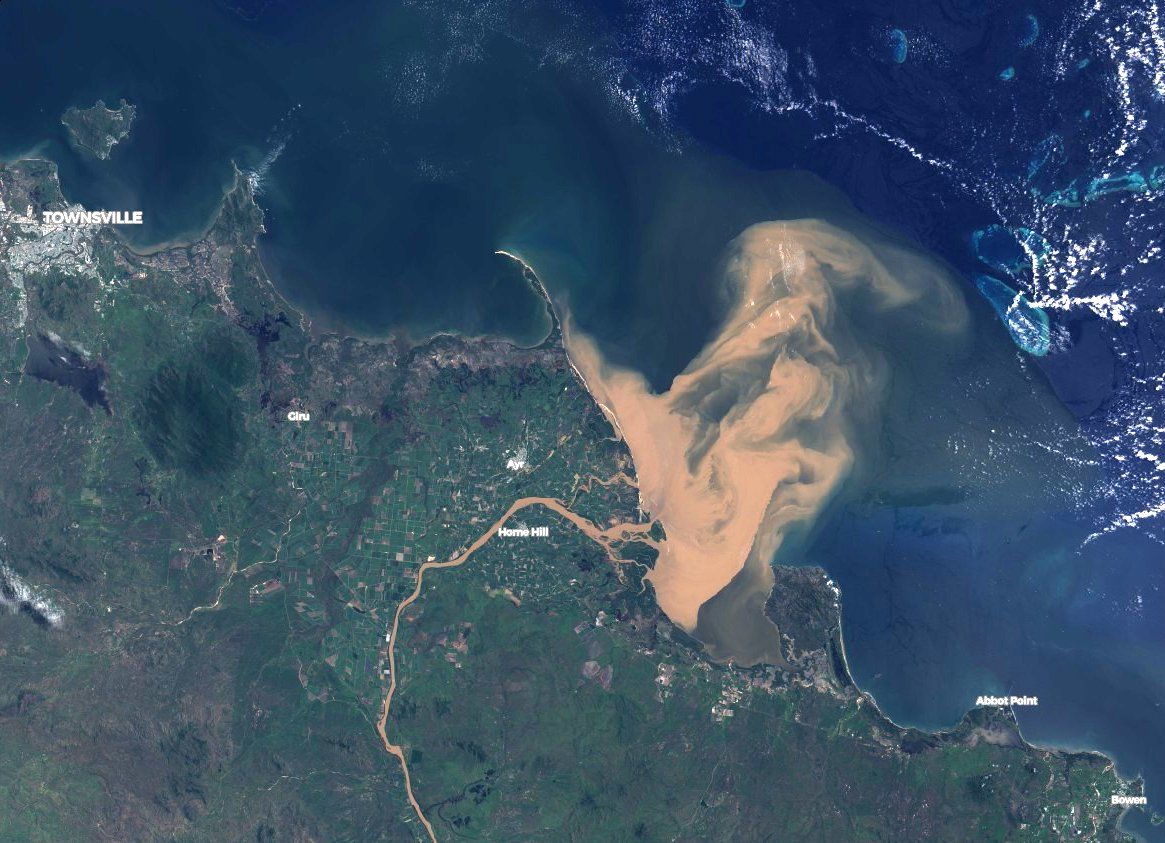
The spectacular Great Barrier Reef (GBR) is one of the wonders of the natural world, but it faces numerous threats ranging from climate change to hungry parasitic starfish. There's now another problem to contend with after heavy flooding in northeastern Australia created vast plumes of polluted floodwater blanketing many parts of the reef.
In the past few weeks, significant quantities of rain have fallen on Australia's Queensland state, washing sediment and harmful chemicals into rivers, which are then being transported into the sea, ABC News reported.
The plumes of dirty water are so large that they can be seen from space. In fact, satellite imagery indicates that the flood runoff is affecting portions of the reef located up to 37 miles from the coast.
"If you look at the remote sensing images, the one that's standing out at the moment is the Burdekin, which is the biggest river in that area," Frederieke Kroon from the Australian Institute of Marine Science (AIMS), who is part of a team which is monitoring water quality in the region, told ABC.
"Over the last two weeks, other rivers have produced large flood plumes as well, which have dissipated since then," but they are still affecting an "extraordinarily large area," she said.
Scientists say that the polluted runoff—which could include chemicals commonly used in agriculture, such as nitrogen and phosphorus—has the potential to kill coral and seagrass in the reef if it persists for long enough.
"One of the main effects of getting that transported out to the reef is that less light can travel through the water and reach down to corals and seagrass ecosystems," Kroon said.
The chemicals in the water have even led to the growth of algae in some areas, creating "thick blankets of green," according to Kroon, the BBC reported. Plumes of dirty water are easily broken up by wind and waves, however, the weather has been relatively calm since the floods.
"Generally, a bit of wind and wave action can break the plumes up quite quickly, but we have literally had no wind, so they're just sitting there hanging," Kroon told the BBC.
At present, it is not clear exactly how much damage the flood runoff is doing to the reef—but the picture will become clearer soon when AIMS issues its report on the situation.
The newest environmental threat couldn't have come at a worse time for the reef, which in the last few years has been struck by a damaging cyclone and two catastrophic mass coral bleaching events—the worst in recorded history.
The events—which occurred in 2016 and 2017—left around half of all the coral dead between them, according to a study published in the journal Nature.
Bleaching happens when corals are placed under stressful conditions, to which they respond by expelling tiny plant-like organisms called zooxanthellae that live inside their tissue, causing them to turn white.
This is not immediately fatal to the coral because they can re-absorb the zooxanthellae. However, if the stressful conditions persist for too long—as was the case in 2016 and 2017 when the reef was exposed to prolonged periods of heat—they die.
With climate change causing the oceans to warm and become more acidic—a result of increased carbon absorption from the atmosphere—destructive bleaching events are only expected to become more frequent around the world. This means that reefs will have less time in between to recover their losses—a process that usually takes at least 10 years, even in the best conditions.
"The [GBR] doesn't even really get time to recover from any of these disturbances because it gets hit with something pretty much every year," Kroon said.
Despite these problems, there may be a silver lining amid the recent events. Cooler floodwaters flowing into the ocean could actually decrease the risk of another mass bleaching event taking place in the coming weeks. Last year, the U.S. National Oceanographic and Atmospheric Administration said that there was a 60 percent chance that such an event would occur by March 2019.
"If you want to have a flipside to the story that would be one, yes, but it's still a huge disturbance to the reef [after] the bleaching and the cyclones that we've had over the last couple of years," she said.
Aside from bleaching, cyclones and polluted water, the GBR—like other reefs around the world—faces a number of other threats, including poor water quality, outbreaks of disease, parasites and destructive fishing or tourism practices.
While several studies have demonstrated that coral reefs exhibit a remarkable ability to bounce back after disturbances, and may even be capable of adapting to rising temperatures, scientists know that the more stress they are put under, the lower their long-term survival chances are. In fact, one recent study has indicated that the multitude of threats coral reefs are facing is hampering their ability to recover, reported Science Advances.
The GBR—which actually consists of more than 3,000 individual reefs—is the largest living structure on Earth, stretching for more than 1,400 miles, while providing a home for thousands of different animal species.
Uncommon Knowledge
Newsweek is committed to challenging conventional wisdom and finding connections in the search for common ground.
Newsweek is committed to challenging conventional wisdom and finding connections in the search for common ground.
About the writer
Aristos is a Newsweek science reporter with the London, U.K., bureau. He reports on science and health topics, including; animal, ... Read more
To read how Newsweek uses AI as a newsroom tool, Click here.








